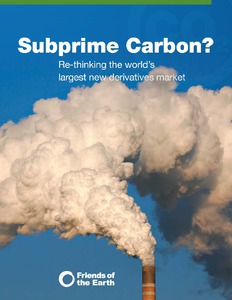Subprime carbon? Re-thinking the world's largest new derivatives market
"This new report finds that existing financial regulations, as well as those in major cap-and-trade bills, are inadequate to govern carbon trading, creating a potentially huge regulatory gap. It also outlines how lessons from the current financial crisis apply to carbon markets. In particular,...
| Institution: | ETUI-European Trade Union Institute |
|---|---|
| Format: | TEXT |
| Language: | English |
| Published: |
Washington
2009
FOE |
| Subjects: | |
| Online Access: | https://www.labourline.org/KENTIKA-19187109124919053819-Subprime-carbon?-Re-thinking-t.htm |
| Summary: | "This new report finds that existing financial regulations, as well as those in major cap-and-trade bills, are inadequate to govern carbon trading, creating a potentially huge regulatory gap.
It also outlines how lessons from the current financial crisis apply to carbon markets. In particular, it raises concerns about "subprime carbon," risky carbon credits based on uncompleted offset projects (projects designed to sequester or reduce greenhouse gases).
Subprime carbon credits may ultimately fail to reduce greenhouse gases and, like subprime mortgages, could collapse in value, yet they are already being securitized and resold in secondary markets. The report recommends that lawmakers include carbon trading in current debates about financial reform, and warns against hastily creating carbon markets without proper oversight." |
|---|---|
| Physical Description: | 13 p. Digital |

